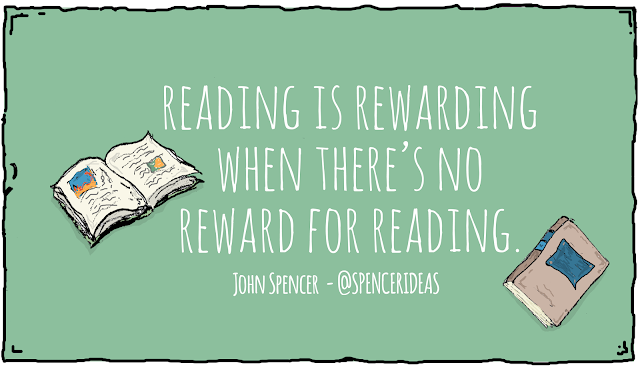Reading is Rewarding When There's No Reward for Reading
Education Rethink 2015-12-22
When I was a kid, I used to get jealous of classmates who were rewarded for reading. They would get video games or money or whatever and it seemed odd to me. I didn't understand why someone would get rewarded for doing something fun. It was like paying a kid to play basketball or draw a picture or play a video game. In our house, reading was the reward. When we did chores, my mom would take us to the bookstore and we would spend our allowance money on books. There was never a "good job" or an "I'm proud of you" or even a "you are such a great reader." It was just so . . . normal. It's what we did at our house. Not unlike breathing or eating or talking. Don't get me wrong. We had to learn how to read just like anyone else. But once that was over, reading was like a never-ending song playing in the background. Some families kept the TV on all the time. Okay, we did, too. We really did have the TV on often - which means I will never be able to un-watch all the episodes of Who's the Boss my sisters made me watch. But we also had magazines lying around and books scattered about and we would talk about the stories in our novels and argue about the ideas in the articles we read. We geeked out over reading but in a way where reading never felt like a big deal. It wasn't until around middle school that I realized how odd our house was. Suddenly, I heard stories of kids getting paid to read. I heard of parents begging their kids to read enough to fill out a reading log. I didn't realize it at the time, but it seemed to confirm an idea that it is now a conviction: reading is rewarding when there's no reward for reading. If you'd like to have me speak on blended literacy, personalized literacy, or choice and inquiry in reading, feel free to visit my speaking page or email me at john@educationrethink.com. 
What About Schools?
I'm not sure how you recover the love of reading in schools. I realize that I grew up in a print-rich household and, as a dad, I see that my kids are experiencing the same. I would be ignoring my privilege if I suggested that we could simply import all the ideas into a school. But I can't help but wonder if maybe a part of the solution is to read for fun. Here are a few of the ideas that worked for me in the classroom (and are the types of strategies I recommend for the pre-service teachers I work with):- Have books and magazines lying around the classroom. Display books in the same way that bookstores display them.
- Switch from reading groups to book clubs, if possible. Small group read alouds my allow you to do specific, targeted intervention. However, when students can read silently and then have a book club with specific questions, answers, and analysis, it feels more like the way people actually read outside of a classroom setting.
- Allow for choice and inquiry in informational reading. Take reading off-road and let them run wild. I highly recommend both The Book Whisperer and Readicide for strategies on reading for the sheer enjoyment of reading.
- Integrate reading into projects during the empathy, research, and launch phases of the design thinking cycle. But also read for the sake of reading. Let kids geek out about ideas without assigning anything in particular to the task.
- Create longer periods of time when kids can read uninterrupted. Let them hit a place of flow as they read.
- Don't reward reading. Treat it like a playground with tons of sandbox time. Let them see that a library is like a candy shop. Get them comfortable with geeking out over informational texts.

